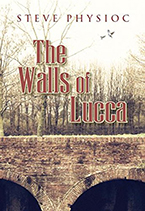April 1, 2019
The Walls of Lucca
Steve Physioc
ISBN: 9781983749520
CreateSpace (2018)
Novel Set During Rise of Fascism in Italy Wins Historical Fiction Award
 Steve Physioc’s The Walls of Lucca offers a look at Italy during World War I and the 1920s, showcasing the events and situations that led to the rise of Mussolini and fascism. That said, it is also a moving story about a family vineyard and the people who work there, particularly two characters, Isabella and Franco.
Steve Physioc’s The Walls of Lucca offers a look at Italy during World War I and the 1920s, showcasing the events and situations that led to the rise of Mussolini and fascism. That said, it is also a moving story about a family vineyard and the people who work there, particularly two characters, Isabella and Franco.
Isabella, an orphan, was raised in a convent from the age of twelve. However, she did not receive the usual Catholic instruction during her childhood, so by the time she arrives at the convent, she has very different ideas about God. She rejects the concept of sin, believing only that fear and ego lead people astray. Instead, she believes in a God of love, and that belief and her emphasis on the importance of forgiveness make her a lighthouse to the other characters in the novel who are often struggling in darknesses of their own makings.
Franco is a soldier who has served in World War I. He saw his brother die before his eyes and had to bury him. Because he left home on bad terms with his parents, he does not return there, but rather finds his way to the Martellino vineyard where he becomes employed and eventually becomes the vineyard’s manager. He also meets Isabella there since she is friends with some of the workers, although she lives at the convent.
Readers won’t be surprised that love develops between Franco and Isabella. What is more surprising is how their relationship develops and how it is not just a romance but a lesson in how to love not just one’s partner but family members and everyone else one comes in contact with.
Also central to the story is Susanna, the wife of the vineyard owner. From the start, she dislikes Isabella, but Isabella refuses to hate her back. Over time the women develop an often strained, yet supportive relationship. Susanna is not easy to get along with, and some of her bad decisions result in trouble for her family, including getting them on the bad side of one of the fascist leaders.
Those interested in the history of Italy will find plenty of information here about the rise of Mussolini and how various groups of people reacted to his rise. But beyond the politics is a message of love and positive thinking. The themes feel a bit modern in their messages, but they are based in ancient wisdom. Isabella continually refuses to give into fear or hate. When things go wrong, she advocates envisioning things working out in a positive way. Today we would say she’s an advocate for the Law of Attraction, but she’s also a voice of wisdom most of this world needs to hear.
The Walls of Lucca is true literature because it’s not just a story set in a historical past. It has a message to share with the world. It’s a message about the power of God and his love. It reminds me of the novels of Elizabeth Goudge, one of my favorite twentieth century authors. Goudge’s characters, in beautiful novels like Green Dolphin Street and The Child from the Sea, were often lost but found reaffirmation of their importance and purpose by the end. Steve Physioc writes a lot like Goudge, and I welcome the return of a voice that advocates for always trying to make the best out of a bad situations and to step beyond our kneejerk reactions to consider how our actions can make a difference for the better if we make the effort.
The Walls of Lucca is a novel to read, enjoy, think about, and apply to our daily lives. A sequel, Above the Walls, has also just been released that takes the story and characters into World War II.
For more information about Steve Physioc and The Walls of Lucca, visit www.StevePhysioc.com.
— Tyler R. Tichelaar, PhD and award-winning author of When Teddy Came to Town and The Best Place.

